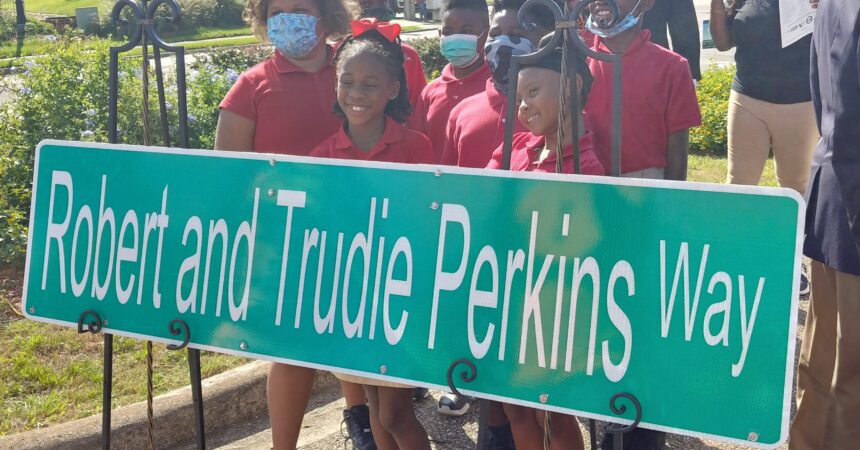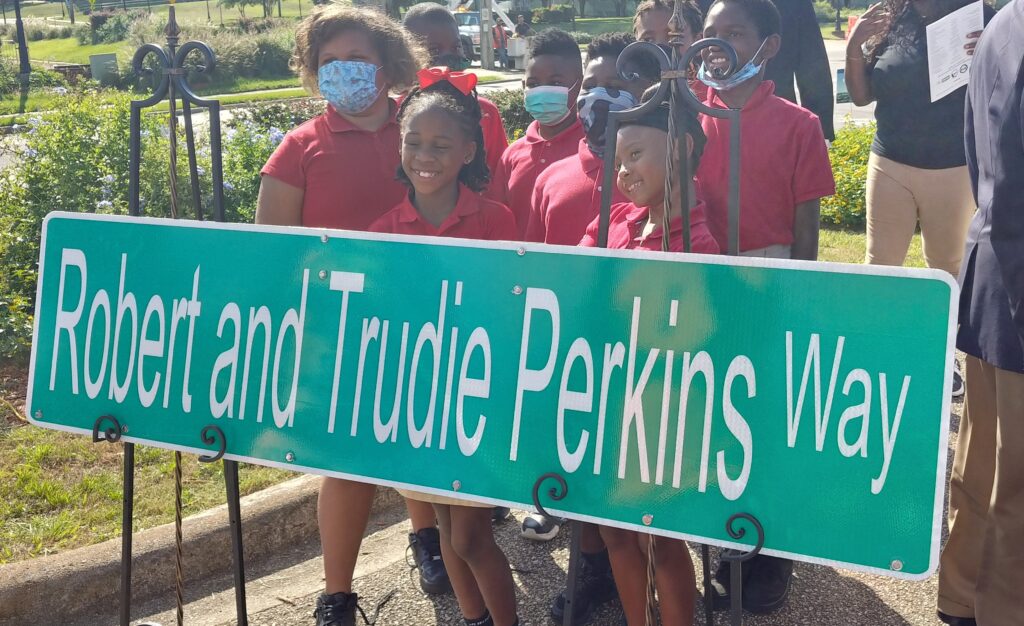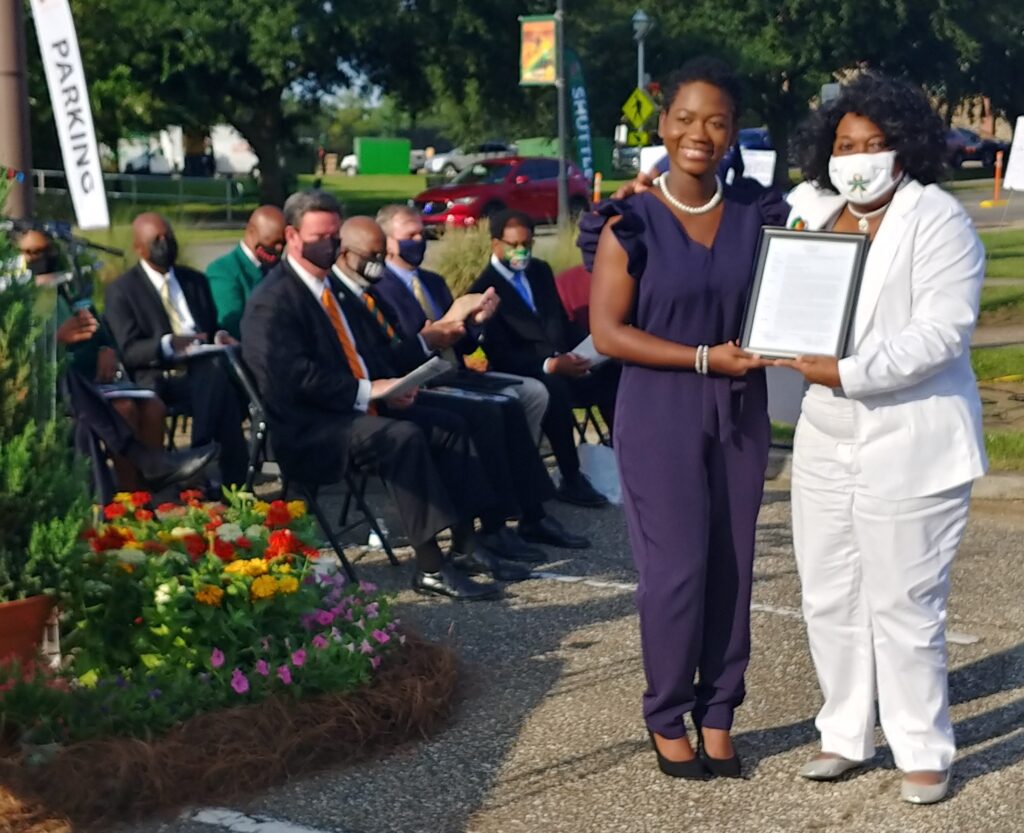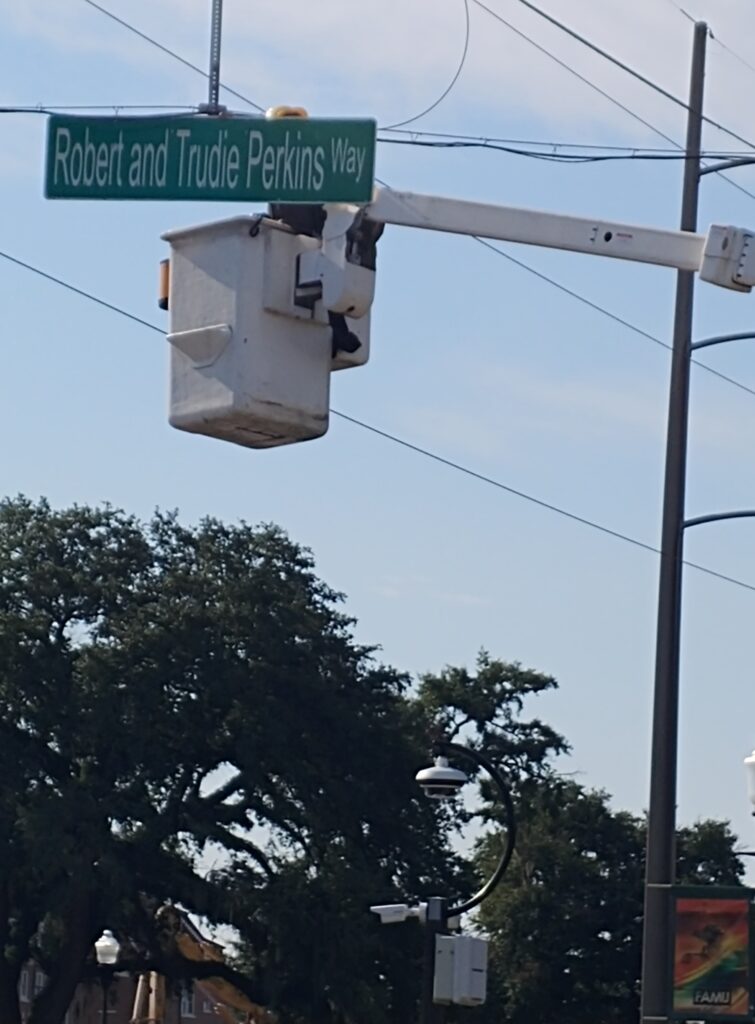
Robert and Trudie Way now runs through FAMU campus

Photo by St. Clair Murraine

Photo by St. Clair Murraine

Photo by St. Clair Murraine
By St. Clair Murraine
Outlook Staff Writer
Robert and Trudie Perkins were a Southside Tallahassee “power couple” decades before the phrase became a thing.
Some of what they did affected the lives of people like Jarvis Rosier, who lived in their neighborhood. A retired sergeant major and president of the Colored Troops Project, he recalled seeing the Perkins work.
Rosier and others who knew the couple said the challenges they took on to improve the lives of Blacks in Tallahassee went far beyond their neighborhood in the Bond community.
“They were business owners, courageous and tireless civic leaders who found that their purpose in life was service,” Rosier said. “That was the power couple that they were. They stood in the gap and fought for equality for all, social justice for all, desegregation of city and county facilities, access to employment opportunities (and) economic empowerment. I can go on and on about what they did.”
While Rosier didn’t, many on the lengthy list of speakers who showed up did. They came together on FAMU campus for a ceremony last Friday when Robert and Trudie Way replaced Gamble Street.
The effort to rename the street was led by Jacqueline Perkins, the couples’ daughter and Delaitre Hollinger, executive Director of the National Association for the Preservation of African-American History and Culture.
Perkins and several other family members attended the ceremony. She used a photo of her grandson telling his great grandparents’ story as a reminder to the audience that what transpired was about the future.
“This is about lighting a fire to inspire others to stand up for what you believe in,” she said.
The renaming removes the name of a former slave owner from the roadway that runs through the university’s campus from FAMU Way to Martin Luther King Blvd. It took place on a sunny day that also marked the 75th wedding anniversary of the Perkins.
“This shows how positive change can happen,” Hollinger said. “This shows that now is the time for us to stand up to be heard (and) be seen. Now is the time to take our place as African Americans who made significant and positive contributions in the history of this nation.”
Trudie Perkins died in 2013, 19 years after her husband. Both were FAMU grads who met on the campus, where they also worked.
FAMU president Larry Robinson called the couple “courageous and persistent in their efforts” for the civil rights work they did during segregation.
“Seeing people like this being recognized for their effort in the struggle touches me in a very, very special way,” Robinson said. “I can’t tell you what this feeling is like (but) that’s what I feel every day when I come to work at FAMU because throughout our 133-year history these are the kinds of things that people from FAMU do to make this community, the state (and) this world great.”
Indeed the Perkins did. There was no flinching or hesitation when the Perkins took on an issue, according to accounts by Hollinger.
Robert Perkins took on all levels of government on many fronts. He once called for the resignation of Gov. Reubin Askew for not appointing Black circuit judges. That resulted in Joseph Hatchett becoming the first Black circuit judge.
In the early 1950’s, Perkins’ insistence on taking Black children to predominantly White recreation facilities resulted in the city creating the Gaither Recreation and Parks for Negros in 1954.
Hollinger said the Perkins were “ordinary individuals who did extraordinary work.”
He noted that Trudie, one of the first Black nurses to work at Tallahassee Memorial HealthCare, often took the elderly in their neighborhood to doctor’s appointments. She and coworker Lizzy Smith also took action that led to better working conditions and pay for Black nurses.
“They were anointed and appointed by God to make life better for others in our city, even though they both paid with the loss of their jobs,” Hollinger said.
Robert Perkins, who was a math and physics instructor at FAMU, took the city to court over its hiring practices and federal judge Winston Arnow agreed with Perkins in the 1975 case, mandating that the city hire Black people at a ratio of 23.7 percent, the ratio of Blacks who lived in Tallahassee at the time.
Current deputy city manager Cynthia Barber lauded the Perkins, saying they are the reason she is an administrator in the government.
“I know without a doubt,” she said, “I stand on the shoulders of Mr. and Mrs. Perkins and others.”
Leon County Commissioners took the final act last July to make the name change official. City Commissioner Dianne Williams-Cox also got behind the move after it was brought to her attention.
She and others were inspired to hasten the push after learning of Gamble’s ties to slavery. Also having a street running through FAMU’s campus with a slave owner’s name was troubling to the decision makers.
Stands the reason that last Friday’s ceremony seemingly was somewhat of a celebration.
“When these students at Florida A&M see these street signs, they should be inspired,” said Hollinger. “My prayer is that they will be inspired to make positive changes.”







